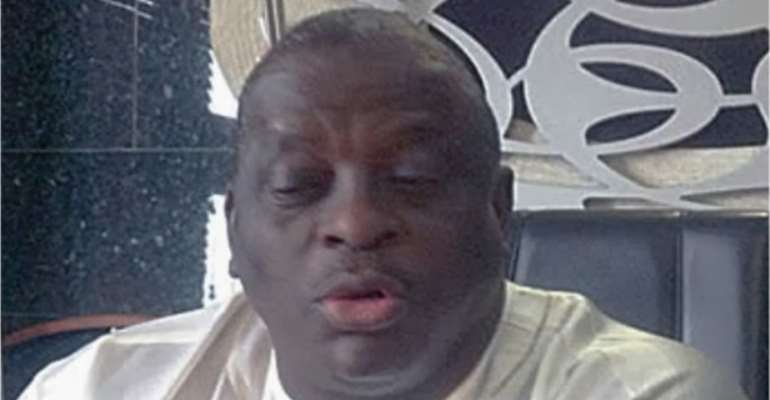Fresh Trouble For PDP Chieftain Kashamu As U.S. Court Declares Him A Fugitive, Orders Trial, Throws Out His Application To Quash Indictment

It is not yet Uhuru for a chieftain of the Peoples Democratic Party (PDP), Chief Buruji Kashamu, as a United States of America's Court of Appeals for the 7th Circuit, sitting in Illinois, has thrown out his application to quash the request for his extradition, thus declaring him a fugitive wanted in America for trial for alleged drug-related offences.
Presiding judge of the court, Justice Charles R. Norgle, while delivering judgment in an application by Kashamu for a Writ of Mandamus, refused to quash an indictment issued against Kashamu as the court held that the indictment against him had no expiration date.
“Should he ever come to the United States, whether voluntarily or involuntarily, he could be put on trial in the Federal District Court in Chicago, since the indictment has no expiration date.
'An original indictment remains pending until it is dismissed or until double jeopardy or due process would forbid prosecution under it,' the court held.
It will be recalled that Kashamu was charged in an indictment returned by a federal grand jury in Chicago, along with 13 others, with conspiracy to import heroin into the United States and distribute it, in violation of 21 U.S.C. S 963.
He was also indicted both in his own name and under what the government believed to be two pseudo-names that he used, namely 'Alaji'‎ and “Kasmal”.
Kashamu had filed an application in the U.S. seeking to nullify his indictment following the refusal of a magistrate in the United Kingdom to grant a request by the US to extradite him.
The UK Magistrate had refused to grant the application to extradite him on the ground that the US did not conclusively prove that he was the same Alaji wanted in the US for trial.
But the court noted that 11 other defendants indicted alongside Kashamu pleaded guilty, one proceeded to trial and was convicted, and another could not be found and remained a fugitive.
The court also noted that despite knowing that he was wanted in the US, 'Kashamu remains in Nigeria, living openly, a prominent businessman and a politician belonging to the ruling party.
The court wondered that, “although the United States had an extradition treaty with Nigeria, our government has made no effort to extradite him.”
While asking him to buy a flight ticket to US to come and stand trial, the court said:‎ “There was a good deal of evidence against him. We noted in our previous opinion that among other bits of evidence, 'Kashamu's co-defendants who had pleaded guilty had admitted their participation in the charged conspiracy and identified 'Alaji' as the leader of the conspiracy. Two of them identified Kashamu as Alaji in a photographic line-up, and in the extradition proceeding, the government submitted their affidavits to that effect. ‎
In opposing the petition for mandamus, the Justice Department had told the court that 'the prospects for extradition (from Nigeria) have recently improved and, as a result, the government is optimistic about extraditing Kashamu.'
Kashamu's motion to dismiss the indictment against him, the court further ruled, was premature, 'as he may soon find himself in the district court in Chicago, able to present a fuller case that his right to a speedy trial is being violated.'
However, the court noted that it might be difficult to extradite Kashamu because be was a very influential person in Nigeria, saying
“Given Kashamu's prominence in Nigerian business and government circles, and the English magistrate's findings and conclusion, the probability of extradition may actually be low.'
On his part, Kashamu had argued that the threat to extradite him had prevented him from traveling outside Nigeria lest the United States seek extradition of him from another country, as it did albeit unsuccessfully when it found him in the United Kingdom.
He also said that the outstanding indictment had rubbed off on his reputation and had impeded his business and political interests in Nigeria.
But the court stood its ground, saying : “These are reasonable concerns, but do not support the relief that he seeks from us.
“He was indicted 16 years ago. At any time during this long interval he had only to show up in the federal district court in Chicago to obtain a determination of his guilt or innocence.
“When a suspected criminal flees from imminent prosecution, becoming a fugitive before he is indicted, the statute of limitations on prosecuting him is suspended.
“Similarly, when a defendant flees the country to escape justice, the inference is that he didn't want a speedy trial—he wanted no trial. And if he doesn't want a speedy trial, he can't complain that the judiciary didn't give him one.‎”
‎The court found that the indictment against him to be very serious criminal charges, noting that one of Kashamu's co-defendants was sentenced to 10 years in prison.
“If Kashamu was indeed the ringleader of the drug conspiracy, as he may have been, he might if convicted be given an even heavier sentence–quite possibly a life sentence; 21 U.S.C. S 960(b)(1)(A), authorises a life sentence for a conspiracy to import at least a kilogram of heroin.
“If he wants to fight the charges, he has only to fly from Lagos to Chicago; there are loads of reasonably priced flights.
“How then can he argue with a straight face that the failure of the United States to extradite him entitles him to dismissal of the charges? He can't; and the petition for a writ of mandamus is therefore denied,” the judge ruled.
See the copy of the court document below:
